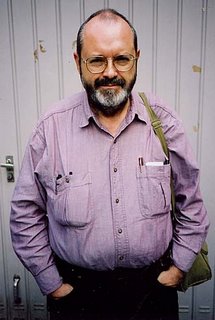 A provocative trail of blog posts has pooled into this entry from Robert Gable's aworks. Hucbald ponders music evolution and argues the merits of understanding the tradition that has elapsed before one's point in the time continuum and approaching composition as a summation of all that has preceded it. An impossibly tall order, but I share Hucbald's impatience with those who choose not to explore the rich sounds from time elapsed. Why deprive one's self from so many compelling sounds and ideas? Even the most distasteful music is informative.
A provocative trail of blog posts has pooled into this entry from Robert Gable's aworks. Hucbald ponders music evolution and argues the merits of understanding the tradition that has elapsed before one's point in the time continuum and approaching composition as a summation of all that has preceded it. An impossibly tall order, but I share Hucbald's impatience with those who choose not to explore the rich sounds from time elapsed. Why deprive one's self from so many compelling sounds and ideas? Even the most distasteful music is informative.Composing involves a deeply personal sense of history and it's important to continually enrich and reevaluate that sensibility. It can be humbling to come back to a composer one had previously dismissed only to find something valued that was missed with younger ears. After enough rounds of that one learns not to be easily dismissive of composers, styles and eras. The ability and/or experience of writing a good fugue and working through proper voice leading technique is almost as valuable as mature humility in the face of a vast ocean of musics. There are more traditions than can be absorbed in a single lifetime let alone individual works.
Gable hit upon a particularly interesting query:
Do composers like Phill Niblock or La Monte Young consider themselves part of the tradition? Do they even care?
 I constantly feel like I'm late to the Phil Niblock party. I haven't yet saturated my ears with his work but plan to do so. What I've heard so far has been outstanding. Is he part of the tradition or an evolutionary outgrowth of it? Certainly, and a valuable part of it.
I constantly feel like I'm late to the Phil Niblock party. I haven't yet saturated my ears with his work but plan to do so. What I've heard so far has been outstanding. Is he part of the tradition or an evolutionary outgrowth of it? Certainly, and a valuable part of it.LaMonte Young is an obsession in both sonic and conceptual territories for me. Would he consider himself part of the "tradition?" It goes back to that personal sense of history. He's carved his own tradition from some deep roots. His study of East Indian music with Prandit Pran Nath is a significant component of his aesthetic. And this can be traced to a significant body of "Pacific Rim" composers who turned to Asian traditions to enrich their "Western" origins. Young's music is a rich part of an evolving American music tradition.


No comments:
Post a Comment